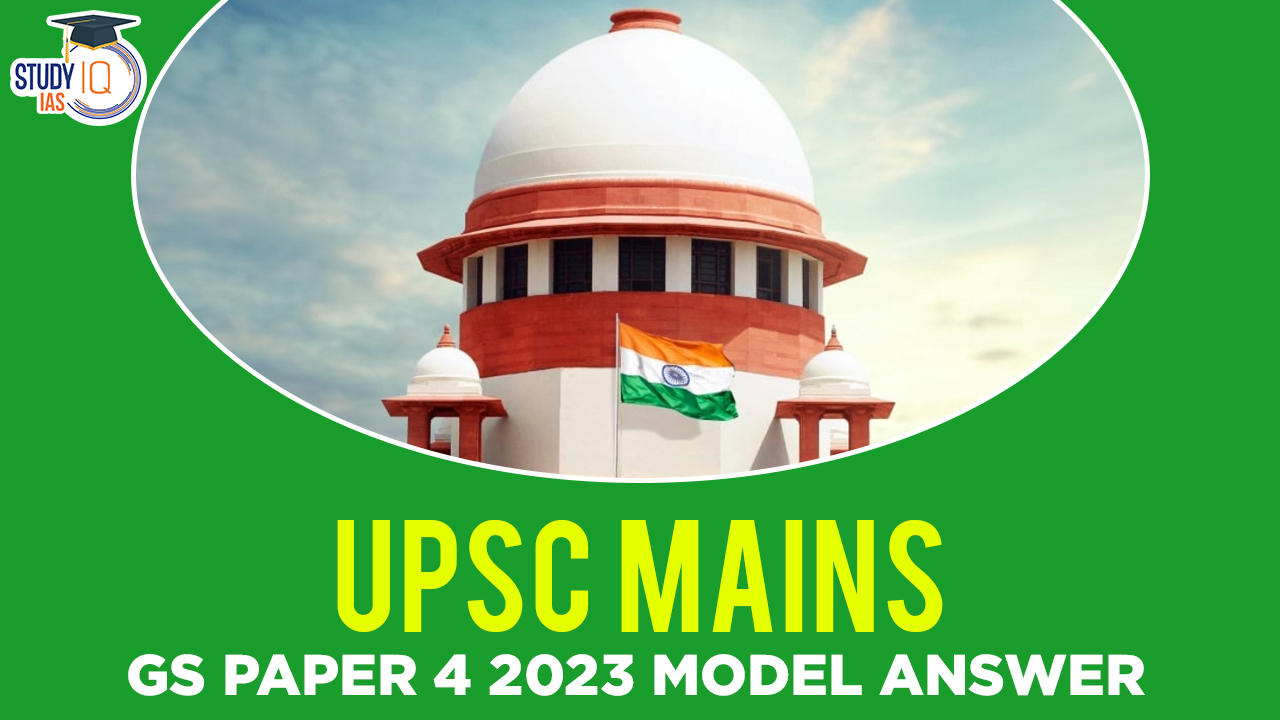Q.4 (b) Differentiate ‘moral intuition’ from ‘moral reasoning with suitable examples. (10m) Theory
Introduction:
Moral decision-making encompasses two fundamental approaches that are moral intuition and moral reasoning. These processes are distinct yet often intertwined in ethical judgments, and their differences are essential for understanding ethical behaviour. Both processes contribute to ethical decision-making, but they differ in speed, emotional involvement, conscious awareness, adaptability, and reliance on logic.
Body:
| Difference between Moral Intuition and Moral Reasoning |
|
Moral Intuition |
Moral Reasoning |
| Nature of Process |
- Moral intuition involves immediate, gut-level responses to ethical dilemmas without conscious deliberation.
- It relies on deeply ingrained moral values and emotions.
- E.g. Gandhiji immediately suspended the Non-cooperation movement due to violence at Chauri-Chaura.
|
- Moral reasoning, on the other hand, involves a conscious and rational evaluation of ethical choices.
- It utilises logical arguments and principles to arrive at a moral decision.
- E.g. a person may choose to be honest after reasoning that lying could harm trust in the long run.
|
| Speed of Decision-Making |
- It leads to quick, instinctive decisions, often bypassing lengthy analysis.
- E.g. a person might instinctively help someone in need without pondering the consequences.
|
- This process is slower as it requires careful consideration of moral principles and potential outcomes before making a decision.
- E.g. a person may deliberate over the ethics of a complex business decision before taking action.
|
| Degree of Conscious Awareness |
- Often occurs unconsciously or with minimal conscious awareness of the decision-making process.
- E.g. Automatically feeling respect for elders due to cultural values.
|
- Involves a higher degree of conscious awareness, as individuals actively engage in analyzing and evaluating ethical choices.
- E.g. Contemplating the ethical implications of a business decision on stakeholders.
|
| Flexibility and Adaptability |
- Tends to be less adaptable and more influenced by ingrained values and emotional responses.
- E.g. Holding a strong, immediate moral stance against a particular action.
|
- Allows for more flexibility, as it considers various perspectives, consequences, and ethical principles, leading to potentially changing ethical judgments.
- E.g. Reevaluating one’s ethical stance on a social issue after exposure to new information and arguments.
|
| Emotional Involvement |
- Emotions play a central role, and decisions are driven by immediate emotional responses.
- E.g. Feeling outrage and taking action when witnessing an act of cruelty.
|
- While emotions may still be present, decisions are primarily based on rational thinking and ethical principles.
- E.g. Making a decision to donate to a charitable cause after carefully researching its impact.
|
| Contextual Example |
- Imagine a person witnessing a child in danger. Without hesitation, they rush to rescue the child, driven by an immediate moral impulse to protect life.
|
- In a corporate setting, a manager faces an ethical dilemma involving the release of a defective product. After evaluating the potential harm and ethical principles, the manager decides to recall the product, making a reasoned moral choice.
|
Conclusion:
In ethical decision-making, moral intuition and moral reasoning serve distinct roles. While moral intuition relies on quick, emotion-driven responses, moral reasoning involves thoughtful analysis. Both processes contribute to the complex fabric of human ethics, offering unique perspectives in various situations.
Check out the UPSC Mains GS Paper 4 2023 Analysis with detailed expatiation of the topics of Mains GS Paper 4 By the Study IQ Experts
Sharing is caring!





















 WhatsApp
WhatsApp